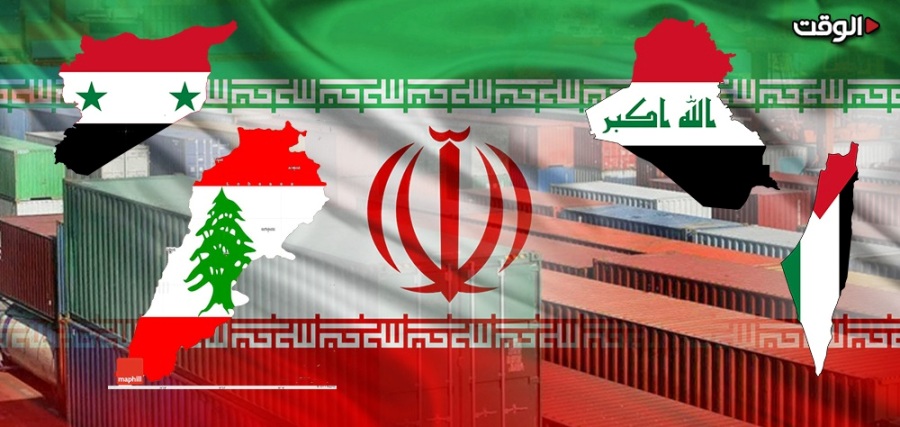AhlulBayt News Agency (ABNA): The security system of the West Asian region has undergone major changes over the last decade. Certainly one of the faces of this change was the power gain of the Axis of Resistance in a fierce competition with the rivals. Defeating the security and military plots of the enemies in Syria and Iraq in the form of obliteration of ISIS self-proclaimed caliphate, securing victory in Yemen over the Saudi-Emirati coalition in a seven-year war, destabilizing Iraq for the American occupation forces and forcing start of the US withdrawal from the region, and securing a triumphant victory over the Israeli regime in Gaza war established a specific position for the Axis of Resistance, a bloc comprised of Iran, Syria, Iraq, Lebanon, Yemen, and Palestine, in the regional security and military order. Still, economy has become the most challenging confrontation scene where the foes take on the Resistance camp, to an extent that the rivals now focus on reversing the defeats and wrestling concessions from the six nations using economic pressures.
In Syria, the US, in addition to foisting heaviest economic sanctions on Damascus that are represented by a ban on transfer of aids to the Syrian government to initiate reconstruction, handed the oilfields to the militants of Syrian Democratic Forces (SDF) to prevent revenues to the central government that can help assuage the economic pains the country has been living for years.
In Iraq, a different formula is adopted and the focus is on distancing Baghdad from its staunch ally Tehran, and also Damascus, through sophisticated sanctions on Iran and Syria that can leave destructive impacts on the Iraqi people's daily life.
In Yemen, a watertight blockade is in place, with the Saudis hoping that it deepens the crisis for Sana'a in the future and forces Ansarullah Movement, the leading power holder in northern Yemen, to succumb to the Arab coalition's conditions in possible peace negotiations.
Lebanon, another arm of the Resistance camp, is wrestling with a biting economic predicament, with the role of the US sanctions and the Arab interventions obvious in the country running into a political impasse. Gaza, under a heavy Israeli siege for 15 years, is in need of humanitarian aids for rebuilding as the Israeli bombardment in last month war left massive destruction there. Tel Aviv and Western governments are playing a game with the reconstruction aids to put strains on Hamas as the dominant force in the Palestinian enclave.
Collective unity against economic pressure scenario
The successful experience of the cooperation of the member states of the Resistance camp in the face of the threat of organized terrorism and the scenarios of internal turmoil has made the bloc consider expansion of this cooperation model to the economic area as the key to solving economic challenges and beating the pressures of the foes. Apparently, the Resistance realm is full of economic opportunities and potentials, and a show of resolve to expand cooperation and transfer knowledge and technology to distance from fragmented and trade-centered economies and embrace complementary and networked economies using massive natural and human resources, sensitive geopolitical position from the Persian Gulf to the Mediterranean Sea and a huge consumer market can not only strengthen these countries to the sanctions pressures but also propel their economic growth.
Despite all challenges, this model is being pursued by the bloc members. To this end, over the past few weeks, there have been visits exchanged by officials from these countries.
One of the most important meetings brought together the Syrian Prime Minister Hussein Arnous and Iraqi Trade and Industry Minister Manhal Aziz Al-Khabaz on Monday to discuss boost to bilateral ties in trade, industry, and deeper economic cooperation to help protect interests and increase the economic growth in the two countries.
Arnous told his Iraqi guest about the Syrian economic potentials, infrastructures, industrial parts, and appropriate ground for work thanks to victory over terrorist groups, adding that Damascus provides all that can facilitate Iraqi investments.
On Sunday night, a Lebanese parliamentary delegation met with the Syrian Foreign Minister Faisal Mekdad to discuss economic cooperation coordination.
"The Syrian-Lebanese sides discussed ways to settle the difficulties of the citizens and cooperate to counter the impacts of the sanctions and messy economic conditions," said Asa'ad Hardan, a Lebanese parliamentarian present at the meeting.
On June 8, Hezbollah Secretary-General Sayyed Hassan Nasrallah told in a speech the Lebanese people that the movement was ready to draw on its good relationship with Iran to help solve the Lebanese problems.
"We, as Hezbollah, can go to Iran and negotiate with the Iranian government and buy shipments of fuel," he added.
Also, the Iranian Minister of Roads and Urban Development and the head of Iran-Syria Economic Commission Mohammad Islami, met Syrian officials in Damascus to discuss decisions for implementation of past agreements. The Iranian-Syrian trade volume in 2020, figures show, was $170 million and is set to increase to $300 million in the current year, said Keyvan Kafashi, the head of the Iranian-Syria Joint Chamber of Commerce. The trade upturn can yield multi-billion commercial volume in the years to come.
/129

